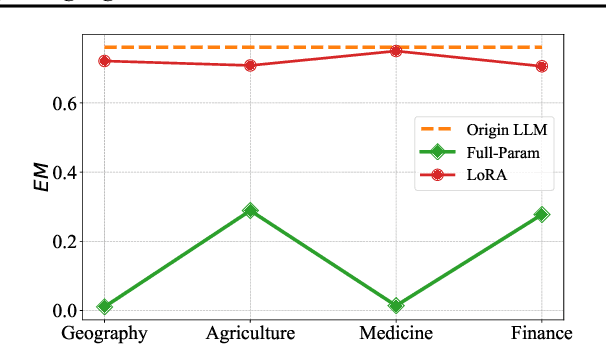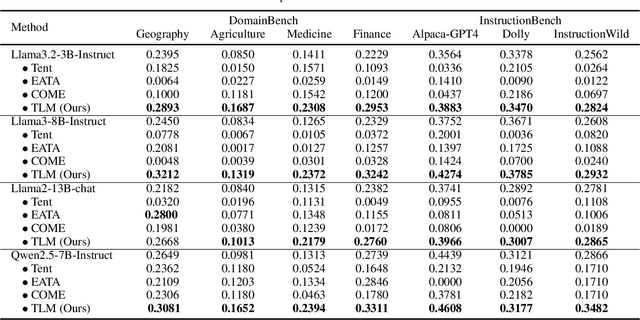Guohao Chen
OmniCode: A Benchmark for Evaluating Software Engineering Agents
Feb 02, 2026Abstract:LLM-powered coding agents are redefining how real-world software is developed. To drive the research towards better coding agents, we require challenging benchmarks that can rigorously evaluate the ability of such agents to perform various software engineering tasks. However, popular coding benchmarks such as HumanEval and SWE-Bench focus on narrowly scoped tasks such as competition programming and patch generation. In reality, software engineers have to handle a broader set of tasks for real-world software development. To address this gap, we propose OmniCode, a novel software engineering benchmark that contains a broader and more diverse set of task categories beyond code or patch generation. Overall, OmniCode contains 1794 tasks spanning three programming languages (Python, Java, and C++) and four key categories: bug fixing, test generation, code review fixing, and style fixing. In contrast to prior software engineering benchmarks, the tasks in OmniCode are (1) manually validated to eliminate ill-defined problems, and (2) synthetically crafted or recently curated to avoid data leakage issues, presenting a new framework for synthetically generating diverse software tasks from limited real-world data. We evaluate OmniCode with popular agent frameworks such as SWE-Agent and show that while they may perform well on bug fixing for Python, they fall short on tasks such as Test Generation and in languages such as C++ and Java. For instance, SWE-Agent achieves a maximum of 20.9% with DeepSeek-V3.1 on Java Test Generation tasks. OmniCode aims to serve as a robust benchmark and spur the development of agents that can perform well across different aspects of software development. Code and data are available at https://github.com/seal-research/OmniCode.
Continual Knowledge Adaptation for Reinforcement Learning
Oct 22, 2025Abstract:Reinforcement Learning enables agents to learn optimal behaviors through interactions with environments. However, real-world environments are typically non-stationary, requiring agents to continuously adapt to new tasks and changing conditions. Although Continual Reinforcement Learning facilitates learning across multiple tasks, existing methods often suffer from catastrophic forgetting and inefficient knowledge utilization. To address these challenges, we propose Continual Knowledge Adaptation for Reinforcement Learning (CKA-RL), which enables the accumulation and effective utilization of historical knowledge. Specifically, we introduce a Continual Knowledge Adaptation strategy, which involves maintaining a task-specific knowledge vector pool and dynamically using historical knowledge to adapt the agent to new tasks. This process mitigates catastrophic forgetting and enables efficient knowledge transfer across tasks by preserving and adapting critical model parameters. Additionally, we propose an Adaptive Knowledge Merging mechanism that combines similar knowledge vectors to address scalability challenges, reducing memory requirements while ensuring the retention of essential knowledge. Experiments on three benchmarks demonstrate that the proposed CKA-RL outperforms state-of-the-art methods, achieving an improvement of 4.20% in overall performance and 8.02% in forward transfer. The source code is available at https://github.com/Fhujinwu/CKA-RL.
Adapt in the Wild: Test-Time Entropy Minimization with Sharpness and Feature Regularization
Sep 05, 2025Abstract:Test-time adaptation (TTA) may fail to improve or even harm the model performance when test data have: 1) mixed distribution shifts, 2) small batch sizes, 3) online imbalanced label distribution shifts. This is often a key obstacle preventing existing TTA methods from being deployed in the real world. In this paper, we investigate the unstable reasons and find that the batch norm layer is a crucial factor hindering TTA stability. Conversely, TTA can perform more stably with batch-agnostic norm layers, i.e., group or layer norm. However, we observe that TTA with group and layer norms does not always succeed and still suffers many failure cases, i.e., the model collapses into trivial solutions by assigning the same class label for all samples. By digging into this, we find that, during the collapse process: 1) the model gradients often undergo an initial explosion followed by rapid degradation, suggesting that certain noisy test samples with large gradients may disrupt adaptation; and 2) the model representations tend to exhibit high correlations and classification bias. To address this, we first propose a sharpness-aware and reliable entropy minimization method, called SAR, for stabilizing TTA from two aspects: 1) remove partial noisy samples with large gradients, 2) encourage model weights to go to a flat minimum so that the model is robust to the remaining noisy samples. Based on SAR, we further introduce SAR^2 to prevent representation collapse with two regularizers: 1) a redundancy regularizer to reduce inter-dimensional correlations among centroid-invariant features; and 2) an inequity regularizer to maximize the prediction entropy of a prototype centroid, thereby penalizing biased representations toward any specific class. Promising results demonstrate that our methods perform more stably over prior methods and are computationally efficient under the above wild test scenarios.
Test-Time Learning for Large Language Models
May 27, 2025



Abstract:While Large Language Models (LLMs) have exhibited remarkable emergent capabilities through extensive pre-training, they still face critical limitations in generalizing to specialized domains and handling diverse linguistic variations, known as distribution shifts. In this paper, we propose a Test-Time Learning (TTL) paradigm for LLMs, namely TLM, which dynamically adapts LLMs to target domains using only unlabeled test data during testing. Specifically, we first provide empirical evidence and theoretical insights to reveal that more accurate predictions from LLMs can be achieved by minimizing the input perplexity of the unlabeled test data. Based on this insight, we formulate the Test-Time Learning process of LLMs as input perplexity minimization, enabling self-supervised enhancement of LLM performance. Furthermore, we observe that high-perplexity samples tend to be more informative for model optimization. Accordingly, we introduce a Sample Efficient Learning Strategy that actively selects and emphasizes these high-perplexity samples for test-time updates. Lastly, to mitigate catastrophic forgetting and ensure adaptation stability, we adopt Low-Rank Adaptation (LoRA) instead of full-parameter optimization, which allows lightweight model updates while preserving more original knowledge from the model. We introduce the AdaptEval benchmark for TTL and demonstrate through experiments that TLM improves performance by at least 20% compared to original LLMs on domain knowledge adaptation.
Self-Bootstrapping for Versatile Test-Time Adaptation
Apr 10, 2025Abstract:In this paper, we seek to develop a versatile test-time adaptation (TTA) objective for a variety of tasks - classification and regression across image-, object-, and pixel-level predictions. We achieve this through a self-bootstrapping scheme that optimizes prediction consistency between the test image (as target) and its deteriorated view. The key challenge lies in devising effective augmentations/deteriorations that: i) preserve the image's geometric information, e.g., object sizes and locations, which is crucial for TTA on object/pixel-level tasks, and ii) provide sufficient learning signals for TTA. To this end, we analyze how common distribution shifts affect the image's information power across spatial frequencies in the Fourier domain, and reveal that low-frequency components carry high power and masking these components supplies more learning signals, while masking high-frequency components can not. In light of this, we randomly mask the low-frequency amplitude of an image in its Fourier domain for augmentation. Meanwhile, we also augment the image with noise injection to compensate for missing learning signals at high frequencies, by enhancing the information power there. Experiments show that, either independently or as a plug-and-play module, our method achieves superior results across classification, segmentation, and 3D monocular detection tasks with both transformer and CNN models.
Dynamic Ensemble Reasoning for LLM Experts
Dec 10, 2024



Abstract:Ensemble reasoning for the strengths of different LLM experts is critical to achieving consistent and satisfactory performance on diverse inputs across a wide range of tasks. However, existing LLM ensemble methods are either computationally intensive or incapable of leveraging complementary knowledge among LLM experts for various inputs. In this paper, we propose a Dynamic Ensemble Reasoning paradigm, called DER to integrate the strengths of multiple LLM experts conditioned on dynamic inputs. Specifically, we model the LLM ensemble reasoning problem as a Markov Decision Process (MDP), wherein an agent sequentially takes inputs to request knowledge from an LLM candidate and passes the output to a subsequent LLM candidate. Moreover, we devise a reward function to train a DER-Agent to dynamically select an optimal answering route given the input questions, aiming to achieve the highest performance with as few computational resources as possible. Last, to fully transfer the expert knowledge from the prior LLMs, we develop a Knowledge Transfer Prompt (KTP) that enables the subsequent LLM candidates to transfer complementary knowledge effectively. Experiments demonstrate that our method uses fewer computational resources to achieve better performance compared to state-of-the-art baselines.
Test-Time Model Adaptation with Only Forward Passes
Apr 02, 2024



Abstract:Test-time adaptation has proven effective in adapting a given trained model to unseen test samples with potential distribution shifts. However, in real-world scenarios, models are usually deployed on resource-limited devices, e.g., FPGAs, and are often quantized and hard-coded with non-modifiable parameters for acceleration. In light of this, existing methods are often infeasible since they heavily depend on computation-intensive backpropagation for model updating that may be not supported. To address this, we propose a test-time Forward-Only Adaptation (FOA) method. In FOA, we seek to solely learn a newly added prompt (as model's input) via a derivative-free covariance matrix adaptation evolution strategy. To make this strategy work stably under our online unsupervised setting, we devise a novel fitness function by measuring test-training statistic discrepancy and model prediction entropy. Moreover, we design an activation shifting scheme that directly tunes the model activations for shifted test samples, making them align with the source training domain, thereby further enhancing adaptation performance. Without using any backpropagation and altering model weights, FOA runs on quantized 8-bit ViT outperforms gradient-based TENT on full-precision 32-bit ViT, while achieving an up to 24-fold memory reduction on ImageNet-C. The source code will be released.
Uncertainty-Calibrated Test-Time Model Adaptation without Forgetting
Mar 18, 2024Abstract:Test-time adaptation (TTA) seeks to tackle potential distribution shifts between training and test data by adapting a given model w.r.t. any test sample. Although recent TTA has shown promising performance, we still face two key challenges: 1) prior methods perform backpropagation for each test sample, resulting in unbearable optimization costs to many applications; 2) while existing TTA can significantly improve the test performance on out-of-distribution data, they often suffer from severe performance degradation on in-distribution data after TTA (known as forgetting). To this end, we have proposed an Efficient Anti-Forgetting Test-Time Adaptation (EATA) method which develops an active sample selection criterion to identify reliable and non-redundant samples for test-time entropy minimization. To alleviate forgetting, EATA introduces a Fisher regularizer estimated from test samples to constrain important model parameters from drastic changes. However, in EATA, the adopted entropy loss consistently assigns higher confidence to predictions even for samples that are underlying uncertain, leading to overconfident predictions. To tackle this, we further propose EATA with Calibration (EATA-C) to separately exploit the reducible model uncertainty and the inherent data uncertainty for calibrated TTA. Specifically, we measure the model uncertainty by the divergence between predictions from the full network and its sub-networks, on which we propose a divergence loss to encourage consistent predictions instead of overconfident ones. To further recalibrate prediction confidence, we utilize the disagreement among predicted labels as an indicator of the data uncertainty, and then devise a min-max entropy regularizer to selectively increase and decrease prediction confidence for different samples. Experiments on image classification and semantic segmentation verify the effectiveness of our methods.
 Add to Chrome
Add to Chrome Add to Firefox
Add to Firefox Add to Edge
Add to Edge